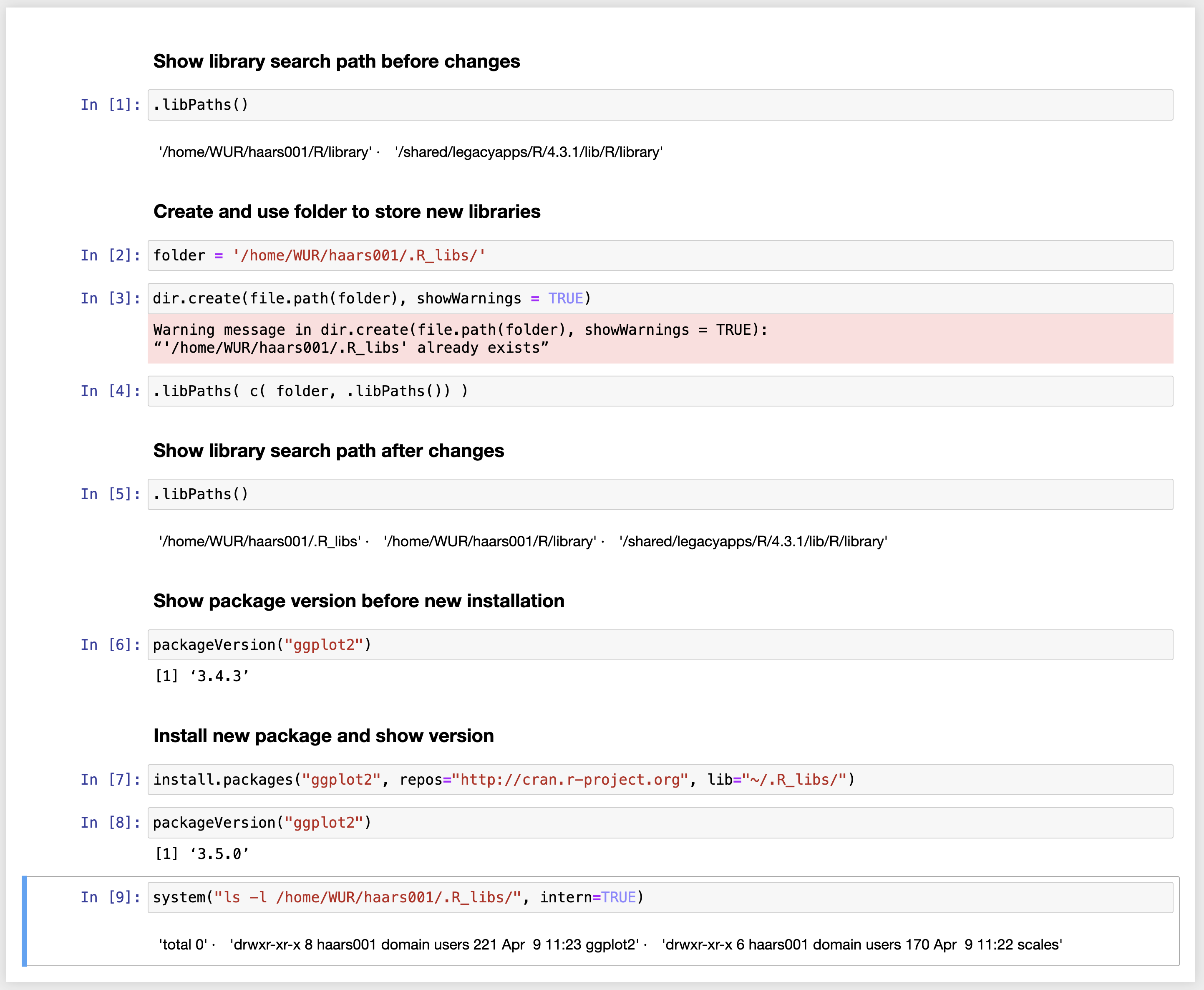Installing R packages locally: Difference between revisions
Jump to navigation
Jump to search
No edit summary |
|||
| (12 intermediate revisions by 5 users not shown) | |||
| Line 6: | Line 6: | ||
You can use several library trees of add-on packages. The easiest way to tell R to use these via a 'dotfile' by creating the following file '$HOME/.Renviron' (watch the quotes and ~ character): | You can use several library trees of add-on packages. The easiest way to tell R to use these via a 'dotfile' by creating the following file '$HOME/.Renviron' (watch the quotes and ~ character): | ||
< | <pre> | ||
R_LIBS_USER="~/R/library" | R_LIBS_USER="~/R/library" | ||
</ | </pre> | ||
This specifies a keyword (<code>R_LIBS_USER</code>) which points to a colon-separated list of directories at which R library trees are rooted. You do not have to specify the default tree for R packages. | This specifies a keyword (<code>R_LIBS_USER</code>) which points to a colon-separated list of directories at which R library trees are rooted. You do not have to specify the default tree for R packages. | ||
If necessary, create a place for your R libraries | If necessary, create a place for your R libraries | ||
< | <pre> | ||
mkdir ~/R ~/R/library # Only need do this once | mkdir ~/R ~/R/library # Only need do this once | ||
</ | </pre> | ||
Set your R library path | Set your R library path | ||
< | <pre> | ||
echo 'R_LIBS_USER="~/R/library"' > $HOME/.Renviron | echo 'R_LIBS_USER="~/R/library"' > $HOME/.Renviron | ||
</ | </pre> | ||
== Installing to a local library search location == | == Installing to a local library search location == | ||
Start up R: | |||
<pre> | |||
< | |||
R # Invoke R | R # Invoke R | ||
</ | </pre> | ||
< | Then, from the R environment, install the packages you require while pointing at the root R-package directory of choice. This example will install from CRAN. | ||
<pre> | |||
install.packages("name-of-your-package",lib="~/R/library") | install.packages("name-of-your-package",lib="~/R/library") | ||
</ | </pre> | ||
== Installing and using a local library from a JuPyteR notebook == | |||
Click on the image. | |||
[[File:R_libpaths.png|thumb]] | |||
== See also == | == See also == | ||
* [[Control_R_environment_using_modules | Control R environment on the cluster using modules]] | |||
* [[Parallel_R_code_on_SLURM | Using parallel R workloads under SLURM]] | |||
* [[Bioinformatics_tips_tricks_workflows | Bioinformatics tips, tricks, and workflows]] | |||
== External links == | == External links == | ||
[http://csg.sph.umich.edu/docs/R/localpackages.html source for material for this aricle] | [http://csg.sph.umich.edu/docs/R/localpackages.html source for material for this aricle] | ||
[http://cran-mirror.cs.uu.nl CRAN homepage] | |||
[http://en.wikipedia.org/wiki/R_(programming_language) R article from Wikipedia] | |||
Latest revision as of 15:49, 9 April 2024
Specifying a local library search location
Specify a local library search location.
You can use several library trees of add-on packages. The easiest way to tell R to use these via a 'dotfile' by creating the following file '$HOME/.Renviron' (watch the quotes and ~ character):
R_LIBS_USER="~/R/library"
This specifies a keyword (R_LIBS_USER) which points to a colon-separated list of directories at which R library trees are rooted. You do not have to specify the default tree for R packages.
If necessary, create a place for your R libraries
mkdir ~/R ~/R/library # Only need do this once
Set your R library path
echo 'R_LIBS_USER="~/R/library"' > $HOME/.Renviron
Installing to a local library search location
Start up R:
R # Invoke R
Then, from the R environment, install the packages you require while pointing at the root R-package directory of choice. This example will install from CRAN.
install.packages("name-of-your-package",lib="~/R/library")
Installing and using a local library from a JuPyteR notebook
Click on the image.
See also
- Control R environment on the cluster using modules
- Using parallel R workloads under SLURM
- Bioinformatics tips, tricks, and workflows
